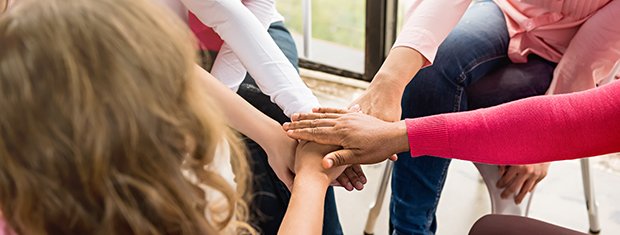
Submitted by the Community Cancer Center
Cancer support groups are meetings for people with cancer and those touched by the disease. They can have many benefits. Even though a lot of people receive support from friends and family, the number-one reason they join a support group is to be with others with similar cancer experiences. Some research shows that joining a support group improves both quality of life and survival.
Support groups can…
- Help you feel better, more hopeful, and not so alone
- Give you a chance to talk about your feelings and work through them
- Help you deal with practical problems, such as problems at work or school
- Help you cope with side effects of treatment
Types of support groups
Some groups focus on all kinds of cancer. Others talk about just one kind, such as a group for women with breast cancer or one for men with prostate cancer. Some can be open to everyone or just for people of a certain age, sex, culture, or religion. For instance, some groups are just for teens or young children.
Support groups can also be helpful for children or family members. These groups focus on family concerns such as role changes, relationship changes, financial worries, and how to support the person with cancer. Some groups include both cancer survivors and family members.
Telephone support groups are when everyone dials in to a phone line that is linked together, like a conference call. They can share and talk to others with similar experiences from all over the country. There is usually little or no charge.
Online support groups are “meetings” that take place online. People meet through chat rooms, listservs, or moderated discussion groups and talk with each other over email. People often like online support groups because they can take part in them any time of the day or night. They’re also good for people who can’t travel to meetings. Always talk with your doctor about cancer information you learn from the Internet.
Where to find a support group
The Community Cancer Center steps in to help families when your life has been impacted by cancer; we encourage you to consider attending our professionally facilitated cancer support groups:
- Advanced Cancer Support Group
- Cancer Support Group
- iCare Cancer Caregivers Support Group
- Spiritual Pathways Support Group
- UsTOO® Prostate Cancer Support Group
- Children & Teen Support Groups
These groups meet at the Center and are free and open to anyone in the community — regardless of where they receive their cancer care. For more information about the groups listed above, go to our website, www.cancercenter.org, or call 309-451-2217.
Is a support group right for me?
A support group may not be right for everyone. For some people, hearing about others’ problems can make them feel worse. Or, you may find that your need for a support group changes over time. If you have a choice of support groups, visit a few and see what they are like. See which ones make sense for you.
If you’re thinking about joining a support group, here are some questions you may want to ask the group’s contact person:
- How large is the group?
- Who attends (survivors, family members, types of cancer, age range)?
- How long are the meetings?
- How often does the group meet?
- How long has the group been together?
- Who leads the meetings — a professional or a survivor?
- What is the format of the meetings?
- Is the main purpose to share feelings, or do people also offer tips to solve common problems?
- If I go, can I just sit and listen?
Before joining a group, here are questions you may want to ask yourself:
- Am I comfortable talking about personal issues?
- Do I have something to offer to the group?
- What do I hope to gain by joining a group?
Support groups vary greatly, and if you have one bad experience, it doesn’t mean these groups aren’t a good option for you. You may also want to find another cancer survivor with whom you can discuss your cancer experience. There are organizations that can pair you with someone who had your type of cancer and is close to your age and background.
Call 309-451-2217 and talk with the social worker at the Community Cancer Center for more information about support groups.

